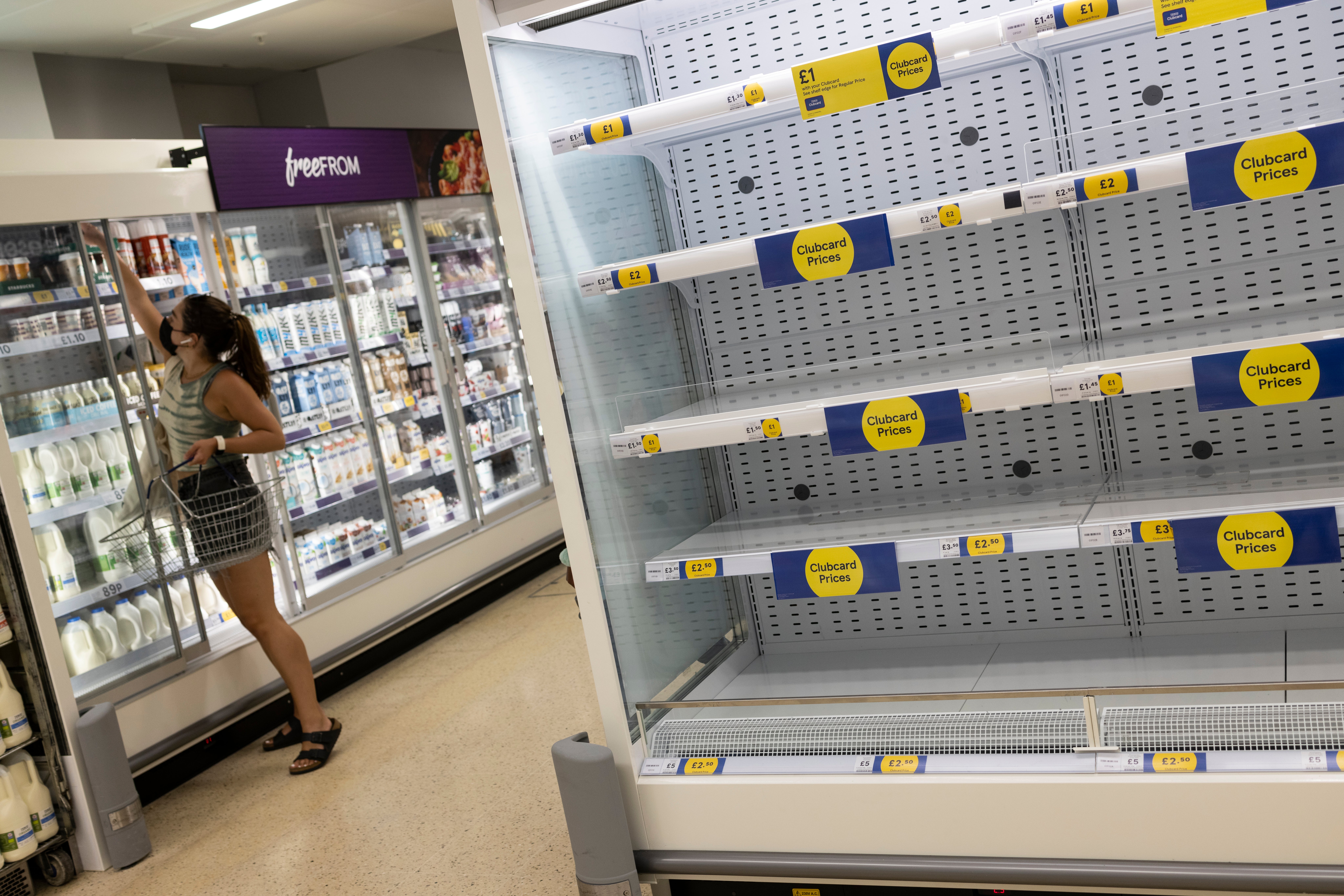Shoppers warned to brace for price hikes as a quarter of food and hospitality firms are hit by shortages
Wage increases may filter through to supermarket prices, say haulage bosses

More than a quarter of food and hospitality businesses have been impacted by stock shortages in recent weeks while shoppers have been warned to expect higher prices as the UK’s supply chain crisis deepens.
A survey by the Office for National Statistics (ONS) found that 27 per cent of food services and accommodation companies have experienced low stock levels, with problems also spreading to other sectors.
A quarter of retail and wholesalers also reported problems, as did 23 per cent of manufacturers.
A host of factors have caused mounting disruption to supply chains, resulting in empty shelves in supermarkets and forcing some restaurant chains to close their doors.
McDonald’s this week ran out of milkshakes as major dairy suppliers struggled with a severe shortage of lorry drivers, while meat processors and fruit farms have also been hit by a long-running labour shortage that has been deepened by both the pandemic and Brexit.
Haulage industry bosses, meanwhile, have warned shoppers to brace themselves for higher prices, while retailers have boosted wages for lorry drivers.
The Road Haulage Association told the PA news agency the “substantial” pay rises on offer could force supermarkets to pass the costs on to customers.
“Certainly, drivers’ pay is increasing, often by quite substantial amounts,” said RHA managing director Rod Mckenzie.
“This, in turn, is a cost that will need to be passed on, and given the tight profit margins of most haulage operators, that means their rates to customers will have to go up.
“In turn, this may mean more of us paying higher prices for goods, services and shopping – including food prices – going forward.”
The RHA added that the situation is “not getting better” and warned that the long period of time needed to train new drivers means Government action is needed.
Problems are not restricted to food supplies. UK car makers reported their worst production figures for 65 years thanks to a global shortage of microchips and workers self-isolating.
Car factories produced just 53,438 vehicles last month, a drop of 37.6 per cent on the same month a year earlier, the Society of Motor Manufacturers and Traders (SMMT) reported. SMMT boss Mike Hawes said the chip shortage “shows little sign of abating”.
Covid has caused disruption to supplies of manufactured goods, and shipping rates have surged this year as economies have reopened, causing demand to rocket.
Suppliers of many goods now in high demand have struggled to keep pace. Plumbers, who enjoyed a boom as people carried out home improvements during the pandemic, have been forced to delay work because vital parts are out of stock, with long lead times.
Kevin Wellman, CEO of the Chartered Institute of Plumbing and Heating Engineering, said the industry had been experiencing growing disruption for 18 months, with problems now deepened by additional red tape after Brexit. “Manufacturers are doing all they can but they can’t just increase supplies overnight.
“It’s just been one thing after another for the poor, unsuspecting tradesperson who has just been trying to get things up and running.”
He warned people they might face delays and urged them to trust their plumber.
Builders have also been dealing with shortages of raw materials and skilled workers. More than one in seven construction firms report that they have not been able to get the materials they need in recent weeks.
Fraser Stewart, architectural director at HOKO Design, said Brexit had been a “massive factor”. The UK’s departure from the EU has caused longer lead times for materials imported from mainland Europe, such as windows, doors, cement, timber, plasterboard, steel and cladding metals, Mr Stewart said.
He added that demand for building materials looked set to remain high, meaning supply issues are likely to persist.
Just over half of manufacturers have said they were able to get hold of the materials and goods they needed, but nearly one in five have had to change suppliers or find alternative ways to get materials, goods or services.
Some industries where manufacturing has remained in the UK have reported fewer issues.
Rob Harding, chief executive of wholesaler Greendale Carpets and Flooring, said British carpet makers had been “coping really well”, despite social distancing in factories and significantly increased demand.
“There are still a large number of UK manufacturers making carpets – it’s one of the few industries that is still dominated by British companies.”
Carpets not made in the UK are often imported from Turkey, a supply chain that Mr Harding said has held up “reasonably well”, while some niche products from further afield have been delayed.
However, the industry is still being affected by increased pay rates for lorry drivers and rising costs of man-made fibres. “It is feeding through to increased prices that we are having to pass on to our members, and they are having to pass on to the public.”
Join our commenting forum
Join thought-provoking conversations, follow other Independent readers and see their replies
Comments

Bookmark popover
Removed from bookmarks